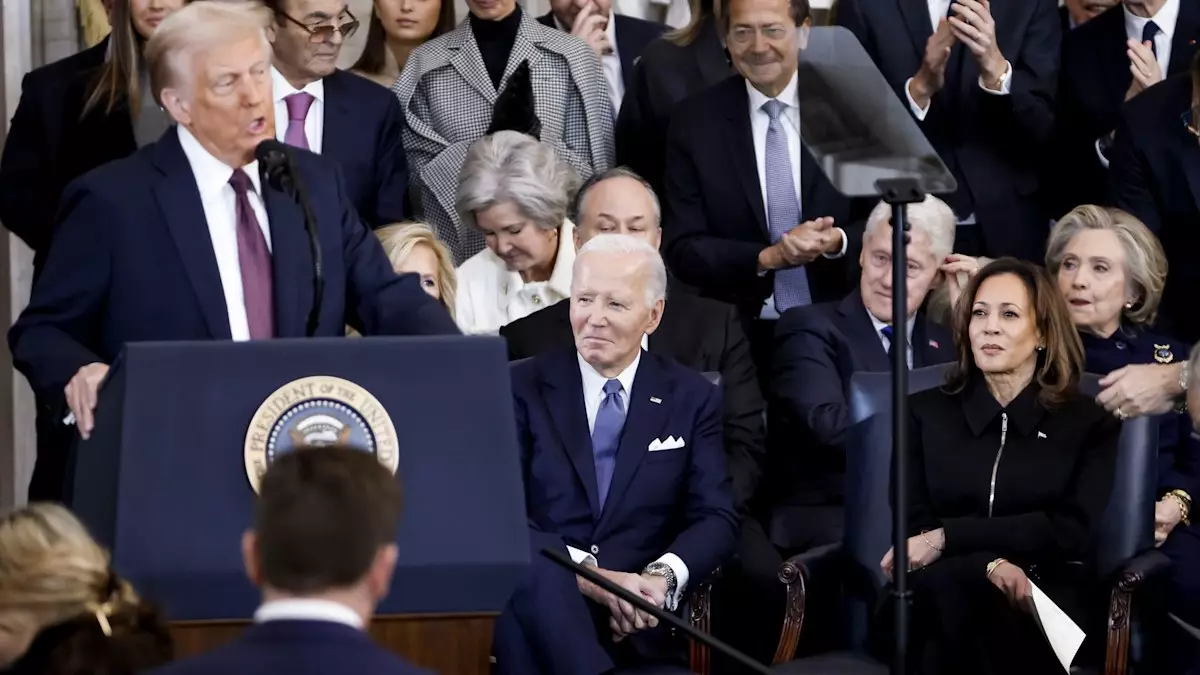Donald Trump’s inaugural speech marked a watershed moment in American political rhetoric, characterized by its brash tone and contentious themes. From the outset, he purposefully positioned himself in opposition to current President Joe Biden, suggesting Biden’s perceived inadequacies in handling crises—a remarkable gambit during a ceremonial address meant to unify. Trump’s direct attack on Biden, delivered with a palpable sense of bravado, showcased his inclination towards confrontation rather than conciliation, even in the company of past leaders and dignitaries. Although traditional inaugural speeches tend to emphasize national unity, Trump’s message resounded with a notion of division, grounding grievances that he cemented as narratives of personal and political struggle.
In what can be perceived as the heart of his address, Trump offered a deeply personal account of peril that resonated with his supporters. He recounted a previous assassination attempt in Pennsylvania, evoking imagery of survival and divine purpose—asserting that he was “saved by God to make America great again.” Such dramatic storytelling served not only to paint him as a warrior for the people, but also exemplified his frequent method of weaving personal stakes into broader political themes. The deliberate cultivation of a sense of victimization and crisis plays to the fears and sentiments of his base. This rhetorical strategy, regardless of its validity, reflects a posturing characteristic of Trump’s presidency, where personal narratives are utilized to garner political legitimacy.
Beyond the emotional plea, Trump’s speech teemed with assertions regarding policy shifts, articulating plans that included stricter immigration laws and enhanced American oversight over territories such as the Panama Canal. However, the details remained elusive, as his declarations felt more like rally cries than comprehensive policy outlines. The rhetoric of “Restoring American greatness” was compelling yet lacked the substance typically expected at an inaugural address. The call for a “national energy emergency,” while impactful in tone, skated over practical implementation, exhibiting a tendency to prioritize aspirational themes over detailed governance strategies.
As his speech neared its end, Trump conjured visions of a “golden age,” proposing that a revived America would rise from the ashes of despair. He projected optimism of prosperity, strength, and respect, yet juxtaposed these ideals with grim assessments of America’s recent struggles. This duality in messaging underscores a broader narrative within Trump’s political approach: the creation of an “us versus them” paradigm, where the nation can only advance in light of perceived enemies or failures. The promise of unity, as articulated in his speech, stands at odds with the divisive undertones that permeate his rhetoric.
Ultimately, Trump’s inaugural address encapsulated the tumultuous landscape of American politics in the early 21st century. His speech was not merely a reflection on the past or a hopeful proposal for the future; it was a strategic assertion of identity in the tumult of the political battlefield. The applause he garnered contrasted sharply with the silence of Biden and Harris, revealing a profound schism within the nation. Rather than constructive unity, Trump chose to manifest division as a rallying point, arguably leading to a fractured discourse that permeated moments beyond his term.
In retrospect, Trump’s inaugural address speaks volumes about the climate of American politics, characterized by raw emotion and challenging disputes. While he seeks to consolidate his base by invoking themes of greatness and opposition, the ramifications of such rhetoric continue to ripple through the very fabric of American society, prompting the question: Can a discourse so heavily laced with division ever truly lead to collective advancement? This lingering query points not just to Trump’s legacy but also to the broader narrative of a nation grappling with its identity.

Leave a Reply